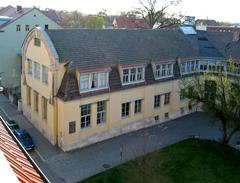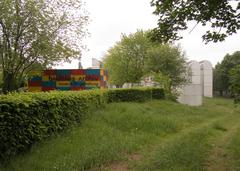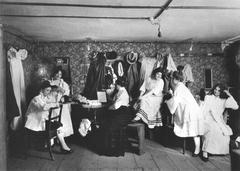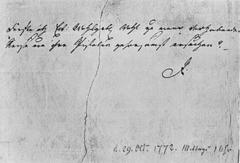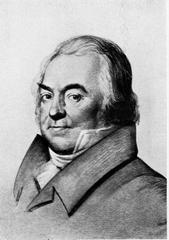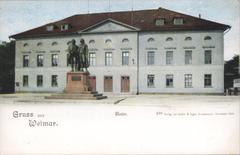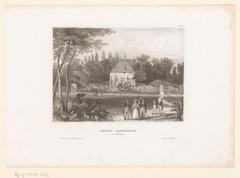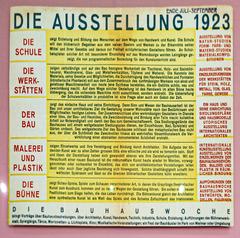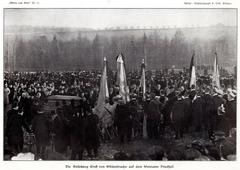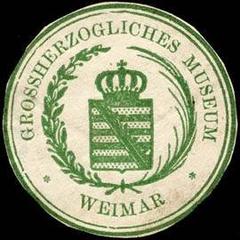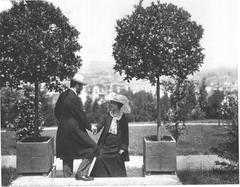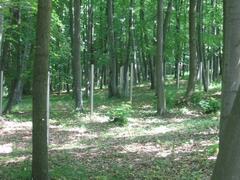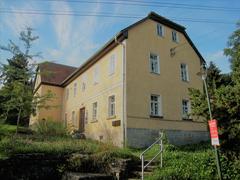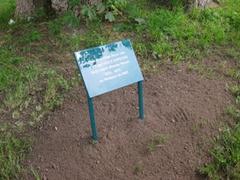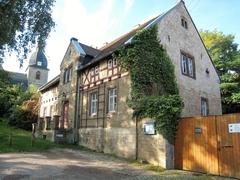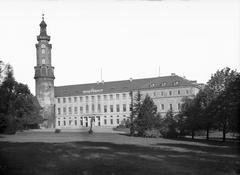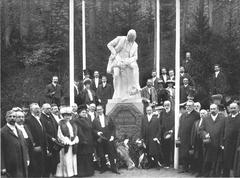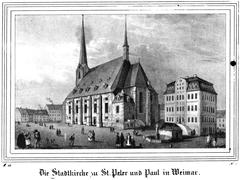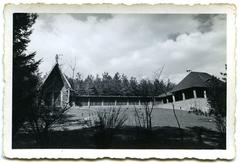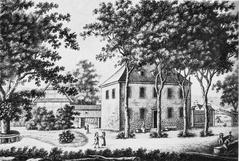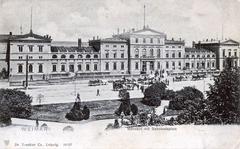Max-Zöllner-Haus Visiting Hours, Tickets, and Guide to Weimar Historical Sites
Date: 14/06/2025
Introduction
The Max-Zöllner-Haus, located in the heart of Weimar, Germany, stands as a remarkable testament to early 20th-century architecture, social philanthropy, and the city’s ongoing commitment to accessibility and social progress. Originally constructed in 1900/01 thanks to the philanthropic bequest of Johann Otto August Max Zöllner, this historic villa bridges the gap between Weimar’s celebrated Classical and Bauhaus heritages and its modern efforts in community inclusion and advocacy.
The villa, found at Gutenbergstraße 29a, is a listed monument that skillfully blends late historicism and early modernist styles, with stucco-decorated façades and a mansard roof. Its adaptive reuse—including as a support center for people with sensory and mobility impairments and as the session hall for the Thüringer Verfassungsgerichtshof (Thuringian Constitutional Court)—reflects Weimar’s dedication to both architectural preservation and evolving community needs.
Visitors to the Max-Zöllner-Haus are welcomed into a fully accessible environment. Barrier-free entrances, tactile guidance, and thoughtfully integrated modern amenities ensure inclusivity for all, in the spirit of Max Zöllner’s legacy. Entry is generally free, and while regular visiting hours may vary, guided tours and special programs can be arranged, offering insights into the building’s history and present-day functions.
Situated near prominent landmarks such as the Nietzsche Archive, Kreuzkirche, and the Duchess Anna Amalia Library, the Max-Zöllner-Haus complements any exploration of Weimar’s rich cultural landscape. Recent renovations have also prioritized sustainability with advanced energy-efficient systems, demonstrating a harmonious blend of heritage and innovation.
For up-to-date visitor details—including opening hours, ticketing, accessibility, and event schedules—guests should consult the official Max-Zöllner-Stiftung website and related tourism resources (Wikipedia; Weimar City Tourism).
Historical Overview
Origins and Historical Context
The Max-Zöllner-Haus is emblematic of Weimar’s transition from its Classical legacy to a modern, socially progressive city. Funded by philanthropist Max Zöllner, the villa was intended as a resource for the blind and deaf community, reflecting early 20th-century ideals of social welfare and accessibility. Its construction coincided with Weimar’s urban expansion and the cultural shifts surrounding the establishment of the Weimar Republic in 1919 (UNESCO World Heritage).
Architectural Features and Evolution
The villa was designed by Carl Reichenbecher and completed in 1900/01. Its exterior exemplifies a blend of late historicism and early modernism, with symmetrical façades, ornate stucco, and a characteristic mansard roof. The 2009–2010 restoration maintained original materials and color schemes while introducing modern amenities and accessibility features (Max-Zöllner-Stiftung; Heinze Architektur).
Inside, the Max-Zöllner-Haus now accommodates organizations serving the disabled community, office spaces, therapy rooms, and the session hall of the Thuringian Constitutional Court. Its restoration prioritized barrier-free access, flexible usage, and sustainable upgrades such as geothermal heating (Architekturführer Thüringen).
Social and Cultural Significance
The Max-Zöllner-Haus has long served as a center for social advocacy, supporting people with sensory and mobility impairments through personalized counseling, peer exchange, and community events. The building’s integration into Weimar’s social life is further underscored by its role as an administrative hub and event venue for disability-focused organizations (bsvt.org; barrierefrei-studieren.de).
Visitor Information
Opening Hours
- General Hours: Monday to Friday, 9:00 AM – 5:00 PM.
- Weekends: Closed (hours may vary for special events; check ahead).
- Tours: Available by appointment.
Admission and Tickets
- Entry: Free for individual visitors and groups.
- Guided Tours: Available upon request; advance booking recommended, particularly for educational or group visits.
Accessibility
- Physical Access: Step-free entrances, elevators, and accessible restrooms.
- Sensory Support: Tactile signage, induction loops, and communication aids for visitors with visual or hearing impairments.
- Assistance: Staff available for support; guide dogs welcome.
How to Get There
- Address: Gutenbergstraße 29a, 99423 Weimar
- Public Transit: Easily accessible by city buses or taxi from Weimar’s main train station (Weimar City Tourism).
- Parking: On-site and nearby accessible parking available.
Facilities Overview
- Therapy and Consultation: Multiple therapy rooms, a gymnasium for group activities, and private offices for confidential counseling.
- Meeting Spaces: Conference rooms with modern technology and induction loops.
- Reception: Comfortable, accessible waiting areas.
- Additional Amenities: Free Wi-Fi, digital resources, and green spaces (awo-mittewest-thueringen.de).
Nearby Attractions
- Nietzsche Archive
- Kreuzkirche
- Duchess Anna Amalia Library
- Bauhaus University
- Haus Am Horn
- Ilmpark (Mapcarta; Kosmopoetin)
Cultural and Social Impact
The Max-Zöllner-Haus is both a preserved historic monument and a living center of civic engagement. As headquarters for the Max-Zöllner-Stiftung and home to disability advocacy organizations, it exemplifies the city’s dedication to inclusive social policy, sustainability, and architectural conservation (Wikipedia; Max-Zöllner-Stiftung).
Its dynamic programming—ranging from seminars and workshops to community meetings—fosters ongoing dialogue and connection between Weimar’s diverse residents and visitors. The building’s sustainable renovations, including geothermal heating and modern insulation, set a benchmark for adaptive reuse in heritage conservation (Architekturführer Thüringen).
Visitor Tips
- Plan Ahead: Contact the Max-Zöllner-Stiftung to arrange visits or join events, as the house is not a conventional museum.
- Accessibility Needs: Notify staff in advance of special requirements; all facilities are designed for barrier-free access.
- Combine Visits: Incorporate the Max-Zöllner-Haus into a broader tour of Weimar’s cultural sites.
- Documentation: Bring any relevant documents for counseling or therapy appointments.
- Language: Services are primarily in German; interpretation can be arranged upon request.
- Health and Hygiene: The facility adheres to current public health guidelines.
FAQs
Q: What are the opening hours of the Max-Zöllner-Haus?
A: Monday to Friday, 9:00 AM – 5:00 PM; closed on weekends. Hours may vary during events—confirm in advance.
Q: Is there an admission fee?
A: No, entry is free.
Q: Are guided tours available?
A: Yes, upon request and primarily for groups or educational purposes.
Q: Is the building accessible for visitors with disabilities?
A: Yes, with step-free access, elevators, and accessible restrooms.
Q: How can I book therapy or counseling sessions?
A: Contact the relevant organization (e.g., AWO Physiotherapy Center or BSVT) ahead of your visit.
Q: Are there nearby cultural attractions?
A: Yes, including the Nietzsche Archive, Kreuzkirche, and Duchess Anna Amalia Library.
Conclusion
The Max-Zöllner-Haus is more than an architectural landmark; it is a vibrant, inclusive institution at the heart of Weimar’s social and cultural landscape. Its legacy of philanthropy and accessibility continues today, offering visitors opportunities for education, advocacy, and community engagement. By planning ahead and making use of its fully accessible facilities, visitors can experience both the rich history and the contemporary significance of this unique site.
For detailed, up-to-date visitor information and to arrange your visit, consult the official Max-Zöllner-Stiftung website and related resources.
References
- Max-Zöllner-Stiftung
- Wikipedia: Zöllnerstraße (Weimar)
- Weimar City Tourism
- Heinze Architektur: Altes Zöllnerviertel Weimar
- Mapcarta: Max-Zöllner-Haus and Surroundings
- AWO Physiotherapy Center Opening News
- Kosmopoetin: Insider Tips for Weimar
- Architekturführer Thüringen: Max-Zöllner Villa Renovation
- barrierefrei-studieren.de
- bsvt.org
